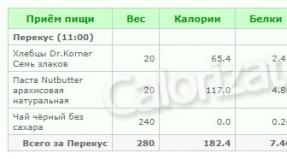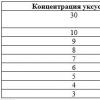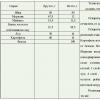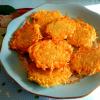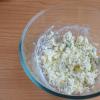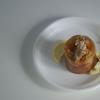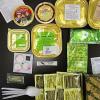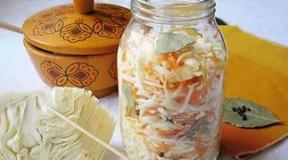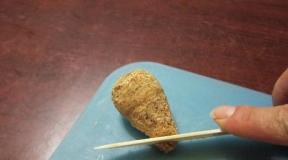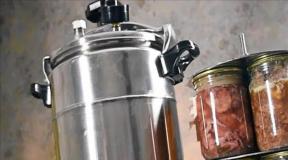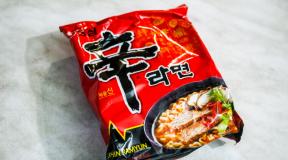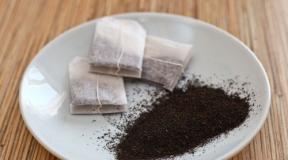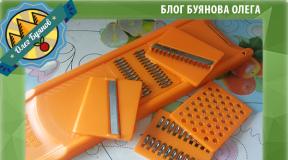Seasonal vegetables and fruits: May, June, July, August, September, October, November. As well as a calendar of vegetables and fruits
The Village continues to collect expert advice on how to improve everyday kitchen chores. We already know how to properly prepare or save a variety of products, and talked about simple tricks that will make it easier and more interesting for you to be in the kitchen. In the new issue, we talked with the creator of the MoscowFresh farm products delivery service, a representative of the Danilovsky market and several sellers of the Preobrazhensky market about what products you need to buy right now and what to look for when choosing them.
Corn
Now they brought to the markets krasnodar corn new harvest. It is cooked in literally 20 minutes, and you don't even need to salt it - such corn itself is already fresh and sweet. You must definitely buy it. Of course, it will be good for the next two months, but now, in my opinion, is the best.
Chanterelles are on sale. So far, they are being brought in in small batches, so they are still quite expensive, but they will gradually become cheaper. The price for them is already changing day by day - for example, a large batch has arrived, and the price is falling. You have to look, you have to look, but there are chanterelles, they will all be equally tasty for those who love them.
The berry season is open - it's time to go to the market for raspberries, blueberries and currants. But, for example, blackberries are still imported, so they are not cheap, they are brought from Azerbaijan. Our blackberry season starts in August, but for now it's time for blueberries. Plus, it is worth buying black and red currants, but gooseberries are still sour, it is better to take them later. Strawberries and especially raspberries now, in the last two weeks, this is what you need. Some time ago, it was still supplied from Moldova, and now our, Russian, sweet real raspberry has appeared on the markets. In general, now the berries are so good that they can even be stored in the refrigerator for some time. But now the strawberry season is over. It's not that scary, because the strawberry itself is a very capricious and problematic berry: either it flows, then it turns out to be too watery, and it is impossible to store it. The same currant, unlike her, lies perfectly.
Tomatoes
Krasnodar tomatoes have been taken from the market as safely as possible for a month now. They are inexpensive and good - I would even say solid. But if you still want something really tasty, it is best to pay extra money for Azerbaijani. The smaller they are, the tastier, and the tastiest are nectarine-sized. Tomatoes like these are the best. You cut it - inside there are green bones, aroma and juicy pulp. And the taste is neither sour nor sweet - just what you need.
Now there are several varieties: Lukhovitsky, as well as larger inexpensive ground cucumbers - all equally juicy and ripe. But, again, if you want something expensive and tasty, then it is best to take Baku ones. They are light green in color and as they were, they remain the most delicate and delicious. But ours, Russian soil, are half the price and also tasty. For a change, you can have a couple of months and eat them.
Pumpkin, squash and other vegetables
The new harvest of pumpkin has not yet arrived, and so far, foreign ones are being brought to Russia. She is small now - literally a kilogram each, light in color, fresh and really very good, albeit expensive. Well, ours will appear in a month or two.
On the market you can already find our cabbage, eggplants and zucchini - all Krasnodar, cheap and without unnecessary chemicals. Plus, a new crop of potatoes appeared on the shelves. If at the end of May - in June there was only Azerbaijani potatoes of the new crop, now ours has appeared. And in no case should you take old crop potatoes, even if offered.
Apricots and peaches
For several weeks now juicy and sweet apricots have been on sale. They should be large enough with an orange tinge, but not green. These will certainly be ripe and fresh. The best variety is "shalah", now in stores it is in the midst of its season. In general, if you go to the market, you definitely need to take apricots.
Flat peaches and nectarines are also seasonal fruits, but flat peaches and nectarines are still better to wait. Wait not long: one to two weeks. So far, the first deliveries of flat peaches are harsh and not as sweet as they should be - again, unlike the apricots, which are already selling well now.
Melon and watermelon
The melon and watermelon season has already begun. Melons are still Uzbek, and watermelons, in addition to Uzbekistan, are already being brought from Dagestan. The most important thing for a melon is that a strong honey aroma comes from it, and it is best to take small ones, two or three kilograms. The classic melon - the "torpedo" variety - is still smaller in size than it will be in some time, but already good. As for the watermelon, everything is simple: knock on it - if it rings, then most likely it will be ripe. Now watermelons are on sale not large, like 10-kilogram in August, but small, three-four kilograms. Theirs is a pleasure.
Anna Shelepova
PR-manager of Danilovsky market
Many fruits are now supplied from the former Soviet republics - apricots, peaches, nectarines, plums are brought from Armenia, Azerbaijan and Uzbekistan. And, for example, red-sided pears of the "Farrell" variety are brought from South Africa. When choosing fruits, you need to remember that ripe fruits should not be too hard or too soft. Oozing and crumpled fruit can only be a good base for jam.
The cherry season will last until August. It can be bought in three varieties: yellow is brought from Armenia, pink and red - from Uzbekistan. The stalks of a good cherry should be green and firm, and the berries should be free of cuts and dents, otherwise they will quickly deteriorate. Also, freshness is easy to determine by smell: fermented berries are definitely not worth buying.
And other berries
From mid-July to mid-August, there will be local strawberries on the market: from Tambov, Lipetsk, Volgograd, Rostov regions and Krasnodar Territory. Strawberries should be chosen by their smell: ripe ones have a bright aroma.
In general, July is the time to buy raspberries, blueberries, blackberries, gooseberries, as well as black, white and red currants. Such a sweet season will last for about a month - until mid-August. When choosing, everything is obvious: you do not need to buy berries with brown spots and crumpled ones. Those that do not keep their shape are still suitable only for jam.
By July, local vegetables near Moscow ripen, including zucchini. At Danilovsky you can buy unusual varieties - for example, round zucchini, which are convenient to stuff, or yellow-green, very bright, “gentle marshmallow” varieties - they have a sweetish taste, and you need to eat them raw. They are grown by a farmer from the Moscow region Svetlana Ivanova, she can be found on the market only three days a week, from Friday to Sunday. By the way, she also sells zucchini flowers - a rather rare product for Russian cuisine. They are delicious to fry in batter.
White turnip near Moscow appeared on the market in mid-June. Now, purple turnips have been added to it - softer, juicier and sweeter, less fibrous. The surface of a good turnip should be smooth, free from stains and damage. A ripe root vegetable will be heavier than meets the eye.
Young carrots
Such carrots are the sweetest and juiciest. It is sold together with the tops, and it is the tops that will help determine the quality of the vegetable: if it is fresh and bright green, then the carrots will be of high quality.
Tomatoes
In July, tomatoes ripen in southern Russia: in Kabardino-Balkaria, Volgograd and Rostov regions, Krasnodar Territory. Depending on the variety, they differ not only in taste, but also in appearance: there are gray-red “black prince” tomatoes, there are yellow ones, and a little later, green and black ones will appear. They are completely ripe, such colors are a feature of the variety.
Tomatoes range in flavor from sour to sweet. As with plums, I advise you to try to find out which variety you like best. And another important point: summer is not the time for Uzbek tomatoes, now they have a dense, harsh skin. They should be left until winter - then it will be better not to find tomatoes.
Now on the market you can buy, it seems, all known types of greens: dill, parsley, basil, wild garlic, arugula, kale, green onions and shallots, as well as different types of salad. The rules for choosing fresh herbs are quite obvious: they should not have yellow, dried or insect-eaten leaves.
Bell peppers and eggplants will soon ripen on local farms. Now the first melons have begun to appear on the market: Astrakhan "collective farmers" and Uzbek "torpedoes".
By August they will start selling at fairly low prices. Then you should buy watermelons: they will be ripe, saturated with the sun and very sweet.
Anton
Now the season of Russian zucchini and eggplant has begun. In addition, it's time to buy ground tomatoes, cucumbers and peppers - tomatoes are especially good, one to one: ripe, even. All this is ours now, ripened in Krasnodar, its own. It's hot there.
Helena
seller at the Preobrazhensky market
Strawberries, for example, are almost gone. But there are honey apricots "shalah" from Armenia. Moldavian cherry is also gradually leaving - for it, as well as for sweet cherry, now is not the season. The whole sweet cherry has practically departed, even though it is ours, from Crimea. But now is the time for nectarines and peaches - Moldovan and Uzbek. Flat peaches should definitely be taken now. They are from Uzbekistan, large and sweet, 250 rubles each.
The high season for berries, vegetables and fruits is undoubtedly summer. By consuming fresh vegetables, herbs, berries and fruits every day, we replenish the lack of vitamins and minerals, which often occurs during the winter and early spring. However, going for the next purchase of "vitamins" it is worth thinking about which of them ripen during this time period. In this article we will talk about fruits, berries and vegetables that cannot be bought in June, and which, on the contrary, are better to take.
Why is it important to buy fruit in “your season”?
In modern times, we can buy many seasonal fruits, berries and vegetables in supermarkets throughout the year. However, such products have a clear ripening period, therefore, the best taste and great benefits from them can be obtained precisely in “your season”.
Also, you should not buy berries, vegetables or fruits outside of your “season” because unscrupulous suppliers often use special chemicals for the quickest ripening of the crop. On store shelves, such artificially grown vegetables, fruits and berries appear long before the start of their season and usually have a ripe and perfect appearance. However, such products do not carry any, and sometimes even can be harmful to health.
So what kind of vegetables, fruits and berries can you safely take this season?
What fruits, vegetables and berries ripen in June?
Strawberries ripen in early June. Following her. Also, the first month of summer is the cherry and cherry season. In addition, raspberries begin to ripen in June.
Seasonal fruits for June are peaches and apricots. From vegetables in June, radishes, cabbage, carrots, green onions, peppers ripen. Spinach, lettuce, parsley, basil and other vitamin-rich greens also ripen in June.
What fruits, vegetables and berries cannot be bought in June?
In June, you should not buy seasonal fruits, vegetables and berries, which ripen in late summer - early autumn. First of all, these include grapes, watermelons, melons. in August, however, many of us would not mind trying this delicious berry in June. However, before you buy watermelons before the start of the season, you should think: could they have ripened already at the beginning of summer on their own without using any chemical additives?
Therefore, in June it is strongly discouraged to buy the following products: grapes, melons (watermelons, melons), eggplants, tomatoes, pears, plums. It is better to wait for the pores of their natural ripening, but for now - enjoy the June seasonal "vitamins".
Shutterstock.com
Who has not been in such a situation? You buy luxurious-looking oranges (strawberries, avocados), taste them, and they taste absolutely impossible. Either the variety is not the same, or the country of origin, or not the season. “The latter is especially important,” says Natalia Fadeeva, Ph.D., nutritionist-endocrinologist of the Center for Family Dietetics "MEDEP". - All fruits and vegetables are best bought fully ripe and not stored for long. Such fruits are not only very tasty, they contain the most vitamins. Whereas in those lying in the warehouse, the amount of nutrients decreases. And in greenhouse fruits and vegetables, harmful ones can even accumulate, since chemical stimulants are used in large quantities to grow such products. "
However, today we have the opportunity to feast on seasonal fruits grown in the open field all year round. Vegetable products are brought to Russia from almost all over the world, when on one continent they harvest, on the other they only sow the beds. You just need to know where and when the best fruits and vegetables come. We asked about this from Andrey Kolchevnikov, category manager of the Azbuka Vkusa company.
Fruits and vegetables: when and what to buy
Oranges. “The most delicious oranges are those brought from the Mediterranean countries, primarily from Spain,” says Andrei Kolchevnikov. - Early varieties begin to ripen in November ... The season lasts until the end of April ... With the onset of winter, red, so-called bloody oranges, grown in Italy, appear on the shelves, with an excellent taste. From February to July, fruits exported from Egypt and Turkey are on sale. But in terms of their consumer qualities they are significantly inferior to European ones. So, be sure to ask the seller: where the goods come from. " South African and Peruvian are replacing the Mediterranean - they are traded from July to the end of December ... Such fruits are often picked green. They ripen on the road, which does not have the best effect on the taste and nutritional properties.
Apples. The season of the tastiest and freshest begins in August ... At this time, early varieties of fruits from local producers arrive on the shelves of our stores. The apple season in stores lasts on average until the end of February . « During the winter months the main suppliers of good quality fruit are the countries of the southern hemisphere, primarily New Zealand, Chile and Argentina, - says Andrey Kolchevnikov. - It should be noted that with the advent of smart fresh technology, it became possible to preserve apples for a long time, without losing their consumer qualities. Thus, these fruits can be considered multi-season .
Persimmon. Her season begins in October and ends late January - early February ... At this time, it comes to us mainly from Azerbaijan and Uzbekistan, as well as from Turkey and the Balkan countries. “The Spanish is very good,” says Andrei Kolchevnikov. "Its fruits are large, bright orange, very sweet and do not knit at all, since they are picked when ripe."
Strawberry. Almost everything sold in Russia is imported. Even in spring and summer. “The fact is that the berries grown by domestic producers are completely unsuitable for long-term storage and transportation,” says Andrei Kolchevnikov. - The strawberry season starts in March-April ... It was at this time that the berry began to be harvested in Spain, Greece, Portugal. European strawberries can be found in stores up to until the end of October : as a rule, these are late varieties brought to us from Poland. February to April American strawberries, which are grown in California and Florida, are also sold. It tastes great, but it is not often found in our supermarkets. " In other months (almost all year round), there are berries from Ethiopia, Tanzania, Egypt on the shelves. In taste, it is noticeably inferior to European.
Avocado. “The haas variety is considered the most delicious avocado, and it does not matter where it comes from,” says Andrei Kolchevnikov, “Its season lasts all year round, only the countries change - Israel, Brazil, Mexico, South Africa. This variety is the most sold in the world. But in our country, unfortunately, there is not much. We prefer unripe avocados and more tolerant of storage varieties, for example, Pinkerton, Ettinger, Ardit, Fuerte. They are not bad, but as a rule, arrive at our counters very immature. "
Tomatoes. These vegetables are also multi-seasonal. " In any season on the shelves of our supermarkets you can find Azerbaijani tomatoes, which are considered one of the best, ”says Andrei Kolchevnikov. - AND in March-April tomatoes from Italy are on sale, which are also very tasty. And the roads! " A more budgetary option is fruits exported from Turkey or Israel. They are for sale from December to March .
Create a seasonal calendar and enjoy the most delicious berries, vegetables and fruits all year round!
Why is it important to include seasonal foods in your diet? It's simple: they are useful and contain a lot of vitamins, as they ripen in natural, not artificially created conditions. In addition, they are usually much cheaper.
Seasonal vegetables and fruits, as opposed to frozen or canned, taste rich and add variety to your diet. Going for seasonal products, try to shop at local markets, because most of the goods come there "straight from the garden", and they are grown without harmful fertilizers or chemical processing.
To get a good understanding of seasonal products, study the seasonality calendar relevant for the European part of Russia.
Winter
Winter seasonal products are designed to support your immune system, add energy and good mood.
Shallot ripens in autumn and keeps well all winter. It contains a large amount of ascorbic acid and helps the body digest fatty foods that are popular in the cold season.
Be sure to include different types of cabbage in your winter diet: Brussels sprouts, Savoy cabbage, red cabbage and white cabbage. Cabbage is a very valuable product for those who want to control their own weight. It lowers blood sugar, removes excess fluid from the body and improves intestinal motility.
Cranberries, rose hips and citrus fruits - the main sources of vitamin C, which is involved in the regulation of redox processes, carbohydrate metabolism, tissue regeneration and increases the body's resistance to infections.
Turnip ripens in late autumn and helps fight vitamin deficiency in early winter. It contains B vitamins, carotene, iron, potassium, magnesium, calcium and sulfur.
Sweet bell pepper contains B vitamins, potassium, iron, silicon and iodine. By the way, peppers are kept in the refrigerator for about a week, so try to prepare a salad with fresh vegetables as soon as possible.
Early carrot activates intracellular redox processes, regulates carbohydrate metabolism, has antiseptic, anti-inflammatory and analgesic properties.
The second half of summer is good because it's high time young potatoes... Potatoes are very nutritious, they contain slow carbohydrates, fiber and proteins (globulin, albumin, protein, peptone). Also, potatoes contain oxalic, malic, citric and other organic acids. It is most useful to eat young potatoes with their skins, boiled or baked.
At the end of summer, watermelons and melons ripen, which are more than 90% water. Moreover, the content of vitamins and nutrients in these fruits is very high.
Watermelon contains pectins, proteins, calcium, magnesium, sodium, potassium, phosphorus, iron. And vitamins: thiamine, riboflavin, niacin, folic and ascorbic acid, carotene. Watermelon has a strong diuretic, choleretic, anti-inflammatory, antipyretic, laxative and tonic properties. Normalizes metabolic processes, enhances intestinal motility.
Melon contains sugar, vitamins A, P, C, carotene, folic and ascorbic acids, fats, salts of iron, potassium, sodium, fiber. Melon is a good thirst quencher.
Autumn
Early autumn is a season for an abundance of seasonal fruits and vegetables. New ripe fruits are added to the summer harvest. At this time of the year, try to stock up on nutrients and prepare your body for winter.
Autumn beet perfectly cleanses the body of toxins and toxins, enhances intestinal peristalsis and regulates metabolic processes. Thanks to its fiber, organic acids and betaine, beets cleanse the liver and aid in weight loss.
Garlic - it got its pungent and pungent taste thanks to allicin, a trace element that stimulates the protective properties of the body, contributes to the normal assimilation of food and accelerates metabolism.
No wonder they say "if you want to eat, eat an apple", these fruits are rich in pectin and have a low glycemic index, which means that they slowly raise blood sugar levels. Apples useful for strengthening hair and nails, they perfectly cleanse the body and speed up metabolism.
Eggplant Is an almost fat-free source of fiber and potassium. Zucchini, zucchini, squash and pumpkin contain a lot of carotenoids (important for the endocrine system), pectin (lowers cholesterol), lutein and zeaxanthin (good for the eyes).
Vegetables and fruits lose their beneficial properties during long-term storage. The vitamins contained in them disappear after freezing or canning. For example, vitamin C evaporates by 30% after 3 days of storing the product in the refrigerator. This is why it is recommended that you eat as many seasonal foods as possible, raw or with minimal processing.
In order to contact an individual consultant who will draw up a meal plan for you, follow the link.
January 27, 2017, 07:33 2017-01-27Autumn is a bountiful harvest and the brightest time of the year. And also the time for reconfiguring the body: the weather changes, the days are shortened, our body gradually switches to winter mode. About how to maintain your health and live the autumn harmoniously, without losing the energy level accumulated over the summer -. Today we'll talk about why seasonal products will help you support yourself before winter.
Nowadays, on the shelves of shops in any season you can buy almost any fruits and vegetables: pineapples, apples, cucumbers and radishes. But only at certain times are these products seasonal, i.e. the most recent. Seasonal fruits and vegetables contain the most nutrients.
1. The first category of seasonal products is from your region / country (or even better - from your summer cottage).
They should be given preference in the first place:
- the shortest period of time passes from the garden to the counter: vegetables and fruits reach farmers' markets in a matter of days, and sometimes even hours
- they are the least processed: vegetables and fruits intended for quick sale do not undergo special processing necessary for long-term storage
2. The second category of seasonal products is from other countries.
Here it is worth choosing neighboring countries: for example, the season of tangerines and feijoa is already beginning in Georgia, delivery from Georgia to Russian counters is fast enough, so fruits and vegetables come to your table with a good content of vitamins and minerals.
Non-seasonal products can be stored in stores and on shelves for a long period of time, 6-8 months. They can even look very attractive. But the taste will often be lost. And the nutritional value from such a long storage and processing necessary to preserve the appearance of the product drops significantly.
Therefore, catch the colorful season and choose the freshest, both for food and for preparations for the winter.
Dishes from autumn products will help you get the maximum nutrients and support your body before winter time: combine different colors, use gentle cooking methods (stewing, sautéing, steaming, baking), fantasize with different textures - this will provide your body with the most nutrients before in winter.

The best fall foods to boost immunity
Celery
Rose hip
Hawthorn
Sea buckthorn
Autumn vegetables and fruits for maximum vitamins and minerals
for this task, you need to compose a vegetable and fruit rainbow, because each color is a signal about a certain phytonutrient:
Vegetables
Eggplant
All kinds of cabbage
Multicolored peppers
Squash
Tomatoes
Corn
Berries and fruits :
Chokeberry
Lingonberry
Tangerines
The freshest nuts and seeds are also autumn ones: it is better to buy them in the shell and peel them at home before eating.
What to do with all this diversity? Prepare delicious soups, vegetable stews, stuffed vegetables, salads, compotes, prepare for the winter!
(the beginning of September 25th) we will enjoy familiar and new dishes from seasonal vegetables, we will feel how vegetables can help cleanse the body, energize, provide lightness and how tasty they are at the same time in a wide variety of combinations. Hurry up to register, it will be an interesting experience!
In the meantime, I am sharing a delicious seasonal recipe:
RATATUY

Ingredients:
1 eggplant
1 medium zucchini
2 tomatoes
1 clove of garlic
1 cup tomato paste (you can make your own by grinding the tomato in a blender)
Olive oil
Salt pepper
A bunch of greens (parsley, cilantro, dill)
Preparation:
- Cut vegetables into thin slices
- Fold into glass, alternating sequence
- Sprinkle with salt, pepper, garlic. Drizzle with olive oil. Send to the oven under foil for 30 minutes at 180 degrees.
- After 30 minutes, take out and pour the tomato sauce on top.
- Send to the oven for another 10 minutes without foil.
- Done! Serve sprinkled with herbs.

